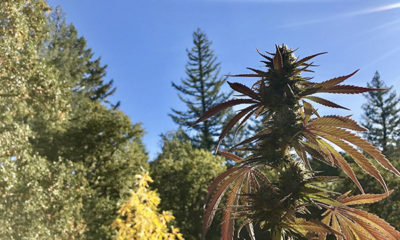
Joint Opinions
Should Cops Run Cannabis Shops?
Once a weed-hater, former Toronto police chief Julian Fantino is behind a would-be cannabis superstore in a gentrifying neighborhood. Is this good?
Before she was a senator and former presidential candidate, Kamala Harris spent most of her political career as a cop and not just any cop, but the “top cop,” the boss of the police, the server of justice. Harris wore the label proudly and openly for a very long time, until sometime this year — the year she claimed to have turned to policing sometime after smoking weed and listening to 2Pac, or maybe it was Biggie, because who can say? — when having been a cop may (or may not) have helped foil her campaign.
All this is to demonstrate that while police remain more popular among Americans than members of Congress and members of the media, wearing a badge and enforcing the rules is a liability, or at least a cause for heavy skepticism in certain circles. One of these circles is the cannabis industry, the past and future bete noir of Drug War fighting cops, at least some of whom spent much of their careers arresting people for nonviolent marijuana possession.
In many American cities and states, former offenders hauled in and “brought to justice” by people like Harris are now being given priority for cannabis business licenses. Such nods to “equity” seem just and equitable and perfectly logical. In other North American cities, former law-enforcement officers appear poised to start profiting from cannabis sales before equity applicants — or anyone else — get a chance to even begin.
Boston, Massachusetts is the biggest city east of the Mississippi where recreational cannabis is legal, but the city still has no storefront dispensaries. (There is one in metro Boston, in Brookline, that’s so swamped with demand customers need to make a reservation.) As Boston Mayor Marty Walsh — who opposed legalization when his constituents approved it in 2016 — has said, one of the first dispensaries poised to receive a license to sell cannabis in Boston is Ascend Wellness whose CEO, Andrea Cabral, is a former sheriff’s deputy and law-enforcement official. Meanwhile, the equity application filed by Leah Cooke Daniels’s company, Alchemy League, has been lost in “pending” limbo for almost two years, as the Boston Globe reported.
Inexplicable delay, bureaucratic inertia, or an example of police profiting from political patronage? Only Walsh, Cabral, and Massachusetts regulators can say, but the situation is bad optics at best and in other places, including Toronto, ex-cops have magically drifted to the front of the line. In that city, a bellicose former police chief who once compared legalizing cannabis to permitting murder and was staunchly opposed to legalization less than three years ago, may receive permission to sell cannabis in a gentrifying neighborhood that’s also home to one of the city’s underground dispensaries, which was denied such permission.
All this begs a question: Cops made the Drug War go; should cops be allowed a go selling the drugs they once pursued — and in the very area that they flooded with officers to disrupt cannabis culture when it was still underground?
Of course they can, as Julian Fantino is demonstrating. Fantino is chairman of Aleafia Health, Inc., a medical cannabis company he co-founded in 2017. Before serving as a police commissioner in the province of Ontario and as a veteran’s affairs minister in a Conservative national government, Fantino in 2004 said legalizing weed was the same as legalizing the death of another person. Maybe, but what if the murder business is good? Shortly after Canadians legalized recreational marijuana, Aleafia entered the recreational market (and Fantino, in an appearance on CBC, flatly denied that Canada had ever waged a war on drugs).
As Caryma Sa’d, a Toronto-based attorney specializing in criminal defense and landlord-tenant disputes as well as cannabis pointed out on Twitter, Fantino’s Aleafia Health Inc. is a minority owner of One Plant Kensington Market, a planned cannabis superstore that would take over space up until recently occupied by a grocery, and is located close to the Hot Box Cafe, one of Toronto’s “original dispensaries” that sold cannabis in defiance of the law since about 2000.
In Toronto, in order to win the right to open up a dispensary, you need to win a literal lottery. Hot Box Cafe’s ownership has twice entered the lottery and lost.
There are plans to open as many as 20 One Plant cannabis chain stores in Ontario, as BlogTO pointed out, with more to come across Canada once those are in business.
Like many neighborhoods in many cities across the world, Kensington is full of mouthy residents who deplore chain stores. They also, as Pedro Marques pointed out on Twitter, remember when Kensington Market was raided by police looking for weed daily and can’t help but remember that the boss overseeing Toronto police at that time was Fantino.
The thing about hypocrisy, however, is that it’s perfectly legal. There is no law that says a vegan can’t open a butcher shop or an ex-cop can’t determine that there’s money to be made slinging weed — even if the optics of doing so in an area that that same cop turned into a militarized zone are atrocious and, for many, infuriating. Toronto residents unhappy with Fantino and unhappy with the whole situation had until Wednesday to make their grievances known to the Ontario cannabis licensing authority, which may choose to deny One Plant’s permit application.
But if it doesn’t — and as a general answer to this thought exercise — only the free market can decide if police will enjoy a second career in the cannabis business. Voters decided Harris’s next promotion wouldn’t be to the Democratic nomination (though she may run again; she may also decide Run-DMC is more her era — who can say?)
“You can frame it anyway you want, but you will never be able to take away my integrity with respect to what I’m doing now and what I’ve done in the past,” Fantino told the CBC in a combative 2017 interview, in which the once-and-former cop reacted to critiques of his record with defiance and factual laxity reminiscent of the American president. Fantino was just enforcing the law, and now he’s merely following it. Whether he’ll be successful in the cannabis business — and establish a model to follow for other police officers — will be up to the weed-buying public of Toronto.
TELL US, do you think cops should be able to enter the cannabis industry?
























